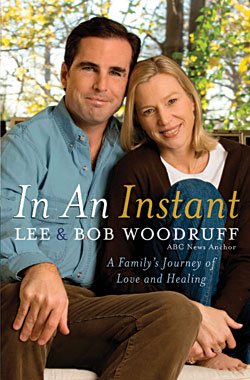
Lee and Bob Woodruff, with daughter Nora, are living with serious health conditions as a family.
Photo courtesy of Stefan Radtke, www.stefanradtke.com
The Woodruffs deal with Bob's TBI and Nora's hearing impairment
Although she's a best-selling co-author, freelance writer and contributor to ABC's Good Morning America, Lee Woodruff is just like millions of other Americans. She is a principal caregiver. On assignment in Iraq, her husband, ABC correspondent Bob Woodruff, was blown up by a roadside bomb and suffers from traumatic brain injury (TBI). As a baby, daughter Nora, now 8, was diagnosed with severe hearing loss. Lee spoke recently with NIH MedlinePlus' Christopher Klose.
At its heart, TBI, hearing loss, any health condition is a family issue, isn't it?
Lee Woodruff: It really is. My brother-in-law said something which has always resonated with me. "It wasn't just Bob who was hit by the IED, it was the whole family." Just substitute anything for "IED."
You're saying the impact is the same, no matter what the problem?
Lee Woodruff: MS, cancer, a hearing disability, autism or whatever. It ripples out to the entire family. So you have to look at anything like that holistically in terms of family.
How do families cope?
Lee Woodruff: A sudden injury, a phone call that changes life in an instant, can bring out the best and sometimes the worst in people. My family has a wonderful support system with siblings and both our parents still alive, so we were able to function as a cohesive unit.
What about Lee the caregiver?
Lee Woodruff: I learned I was really good in a crisis. I kept my head and was able to think strategically and think for him. However, what I call the "Newton's Law" part—that what goes up must come down—doesn't get enough attention. For the caregiver, it is after the acute phase, especially with a brain injury, long-term diagnosis or lifelong disability that the road becomes long, flat and forever.
Fast Facts
- Traumatic brain injury (TBI) occurs when a sudden trauma causes damage to the brain. Symptoms of TBI can be mild, moderate, or severe, depending of the extent of damage.
- About 1.4 million people suffer a TBI each year in the United States. Of those, 50,000 die, 235,000 are hospitalized, and 1.1 million are treated and released at an emergency room.
- The leading causes of TBI are falls (28 percent), motor vehicle crashes (20 percent), other events in which the head strikes or is struck by an object (19 percent) and personal assaults (11 percent).
- People 75 and older have the highest rates of TBI-related hospitalizations and death.
- U.S. hospital emergency rooms treated about 319,000 sports-related head injuries in 2006 (latest figures). That was an increase of 10,000 injuries from 2005.
- Over the last few years, tens of thousands of soldiers have suffered traumatic injuries from blasts due to improvised explosive devices (IED) in Afghanistan and Iraq.
What about the caregiver's helpers?
Lee Woodruff: Everybody wants to help at the beginning. But then comes the "when all the cars have left the driveway" period, when the casseroles aren't being dropped off anymore. There's the feeling that, "Okay, we took your kids to baseball practice for the last couple of months; set meals up for you. You should be standing on your own two legs." That's when you need to bring the dinners, send the flowers; that says, "I have not forgotten you; I'm here to help."
What should caregivers do to help themselves?
Lee Woodruff: One of the best pieces of advice I got was in the hospital, during Bob's acute stage: "Don't go day by day. That's too much sometimes. Go hour by hour." "That's great!" I thought. "I don't have to make it through to bedtime, just from 9 to 10, then see if I feel like making it to 11."
You can't possibly know what is going to befall you, good and bad. Nora's disability was devastating at first, too, because we all have a vision of our children as perfect and normal. Right?
Who's to say what's "perfect"?
Lee Woodruff: Well, there really is no "perfect and normal." The American family is a rich tapestry of different things. If you can look at the world this way, you take a big weight off your shoulders.
"Well, there really is no "perfect and normal."… If you can look at the world this way, you take a big weight off your shoulders."
What else helps?
Lee Woodruff: I found that if I could spend 15 minutes in a quiet room just not answering to "Mom," unloading the dishwasher or being on call was enormously helpful. But that's not always possible. Thankfully, I've learned that human beings have an incredible ability to adjust. What seems so overwhelming, when you take it in bite-size pieces—day by day, days into weeks, weeks into months—you realize you've been able to cope.
How's Nora doing?
Lee Woodruff: Nora has hearing aids and is mainstreamed in school. She has a fair amount of residual hearing.
Can you describe her hearing aids?
Lee Woodruff: They're over the ears. As she gets older, she'll probably choose ones that go completely inside. But these are the best for now. Her teachers wear microphones that transmit directly to her. If you met Nora, it wouldn't be immediately apparent she has an issue. She may never speak quite as crisply as everyone else, so it's hard to know how that will define her and what the challenges may be as she matures.

Photo courtesy of Stefan Radtke, www.stefanradtke.com
Do you talk with her about that?
Lee Woodruff: Not yet. We have tried to keep it matter-of-fact. Like another child might wear glasses, Nora wears hearing aids because she doesn't hear as well as others. It's not a disability but a different ability. But the rubber's going to meet the road in the next few years when the academics become more rigorous.
Where do you go for your medical information to keep ahead of her curve?
Lee Woodruff: The Internet has opened up so much information, such as MedlinePlus, you know. There are so many Web sites and blogs where you can ask questions of other parents.
How is Bob?
Lee Woodruff: Fabulous; on the air, traveling all around the world. There's no medical explanation for his recovery. I look at it sometimes in a spiritual framework; that the only explanation for why those little rocks missed something vital is that he really did have some work to do. He needed to come back because nobody really understands this issue of brain injury among our troops. He does have his challenges, however.
Does he have a speech problem?
Lee Woodruff: Yes, with aphasia. And names are hard. We can be cruising along and then he'll just forget a word. You might not even notice, but I see every little wrinkle because I have been married to him for 20 years. I know when he just needs to stop and go to bed. Fatigue is his enemy.
What about depression?
Lee Woodruff: No. Miraculous. He has his blue days, but he had those before the injury and they're usually work-related. And there are moments when he's kind of down and not really sure why. Then I say, "You had those before. Don't we all?"
Any post traumatic stress disorder (PTSD)?
Lee Woodruff: No PTSD. And none of the real anger other families mention that their injured loved ones have. However, I think we would both agree that his fuse is slightly shorter.
What advice would you have for families who, like yours, have multiple health challenges?
Lee Woodruff: It's really about acceptance of the human heart and mind. As I say to the wives and spouses in the military hospitals and rehabilitation centers I visit, "As horrible as it seems right now, it will get better." Maybe not like Bob, but you will find a way to come to terms with whatever the health issue is. That doesn't mean there won't be good days. There will, and really bad ones, too.
Also, when I was first trying to take care of Bob and the kids and all the challenges, I would tell myself, "I'm one mommy doing the best I can." I couldn't change what happened. So I would urge people also to accept that they can't rewind the tape, and pledge to do the best they can.
Last is a wonderful story from one of Bob's mentors, Jim Wooten, senior ABC correspondent, about his mother-in-law. She'd been dealt a tough life, including a couple of husbands who'd died. Her advice, "Play the hand you're dealt but don't ever stop trying to get your hands on the cards—including stealing that ace over there!"
I think if you keep that in mind, you just feel like you have a sense of control. Half the time, that's what it's about for families.


